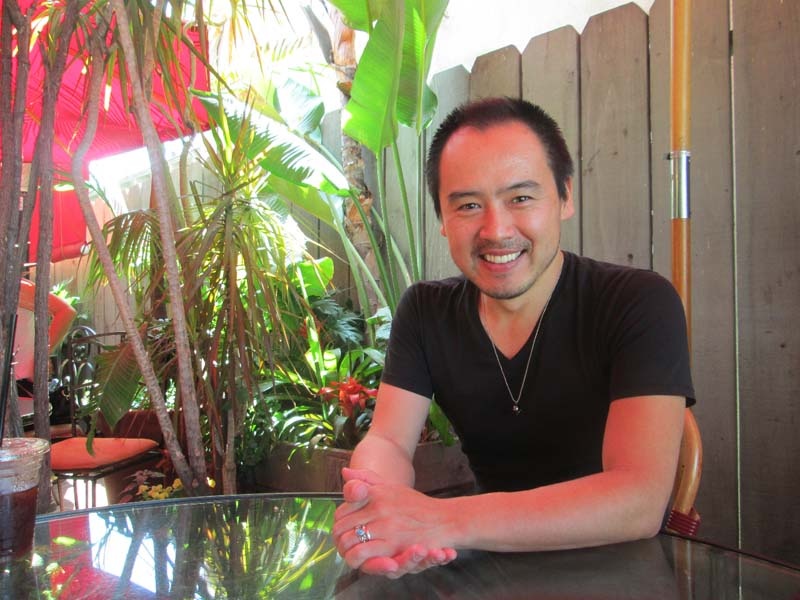Read Part 2 >>
Actor: Eijiro Ozaki
“Lil Tokyo Reporter” is a film led by a Chinese-American director, a third-generation Japanese-American producer and a lead actor. Since the story depicted the lives of first-generation immigrants, I was a little worried about the authenticity of the Japanese language spoken by actors, but there was nothing unnatural about their speech. I shouldn’t have worried at all in the first place. However, later I found out that they had the support from a Japanese actor, Eijiro Ozaki, so I went to have an interview with Eijiro who played the role of Sato in the film.
“I feel very grateful for the fact that this movie, which was filmed in 2011, is still getting attention and covered in the media even though the market for short films is small with few opportunities to get exposure,” he said at the beginning of the interview. Eijiro got his foot in Hollywood movies first by making an appearance in “The Last Samurai,” starring Tom Cruise. He also played the subordinate of Baron Nishi in Clint Eastwood’s “Letters from Iwo Jima” and appeared in the TV drama series “Heroes” most notably remembered for Masi Oka’s famous line, “Yatta!” Thus Eijiro has built his acting career one step at a time since he came to America. First, we asked him how he got a role in a short film which he knew that “wouldn’t get much exposure.”
“Director Jeffrey saw me in ‘The 8th Samurai.’ He liked my acting and asked me if I wanted to take part. This person, Sato, who I played in the film did exist but Jeffrey wrote the script to match the role with my personality. And there was another reason. I left Japan and came to America seven years ago. I’m a so-called ‘new’ Issei. I’ve got permanent residency here in America, have an apartment and a job, living my life without any worries about food or medical care. I believe that I owe a lot to the first-generation Japanese people who came to this land, worked their way up while fighting against discrimination and proved their diligence to this country. So I wanted to show my appreciation for them by taking part in this film.”
As mentioned earlier, Eijiro not only worked as an actor but supervised Japanese pronunciation as well. “Jeffrey, Carole and Chris all trusted me and they asked me to check Japanese pronunciation during script reading. In fact, short lines are more difficult to pronounce than long ones because we can’t fake anything. For example, when calling out the name fujii-san, an English speaker would place an accent on the first letter fu. Japanese audience would find it strange if they heard it in the movie, so I had to be extra careful. Also, when we did dubbing, not only did they let me support Jeffrey but I also worked on the Japanese subtitles.”
In the film, there is a scene where a blackmail letter arrives in Fujii’s office. At a glance, it was so clear that the letter was not written by a Japanese person, so Eijiro himself re-wrote the letter on site.
“Now I feel more thankful for the Japanese-American community”
“Lil Tokyo Reporter,” as you can see, is a piece of work that was completed by third-generation Japanese Americans and the new Issei like Eijiro who trusted and supported each other. Above all, Jeffrey, who took charge of directing and script writing, is Chinese-American. Eijiro talked about the significance of Jeffrey’s accomplishment and what he had to overcome on the way.
“I have so much respect for his courage. He worked with native Japanese people, listened to their voices and portrayed cultures that he’s not familiar with in the language that he doesn’t know. It’s not something that anyone can do. I had the same feeling when I worked with Director Clint Eastwood in ‘Letter from Iwo Jima.’ If we think about this from our point of view, for instance, a Japanese person trying to make a film on the Civil War…maybe the Vietnam War. I’m sure that it would be a very difficult challenge.”
The film was released to the public and has received multiple awards at a number of film festivals. We asked Eijiro how this film has affected him.
“I feel more grateful for the immigrant pioneers from Japan and also for the Japanese-American community. And I was also inspired by the diligence of people who built their life here from scratch. For us who live in the contemporary world, it might not be possible to imagine what it was like to live a life back then. They had the will of steel, the samurai spirit. By learning the history of those pioneers, we as the Japanese feel encouraged to make the world even better. And lastly, if there is another chance to be part of a movie about Japanese-Americans, I would want to play a role again, no matter what it may be.”
At the end of the interview, he gave a message to the future viewers of this film. “If you are non-Japanese, I believe you will be able to see that Sei Fujii was a courageous pioneer. Even if it’s a story of a Japanese person, I would like everyone to watch it with an open mind.”
* DVDs available for purchase on the official site of Lil Tokyo Reporter.
Message from Executive Producer:
"Lil Tokyo Reporter” continues to be screened nation-wide and internationally. Please consider making a tax-deductible donation payable to the Little Tokyo Historical Society to support ongoing promotions. Your much appreciated support will help us share the forgotten civil rights journey of Issei Pioneer Sei Fujii.
Mail to: Lil Tokyo Reporter Film, PO Box 3552, Rolling Hills Estates, CA 90274
F. Carole Fujita
Executive Producer
Lil Tokyo Reporter
© 2014 Keiko Fukuda






